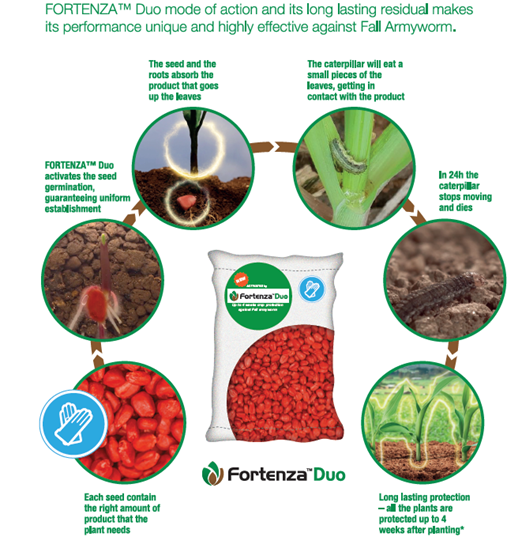Fall Armyworm (Spodoptera frugiperda) is an exotic arthropod pest which is highly damaging to maize in sub-Saharan Africa and Zambia in particular. It attacks maize which is a staple crop in Zambia and many other African countries. The advent of Fall Armyworm (FAW) in Sub-Saharan Africa (SSA) has increased the production costs in maize farming. Maize yield losses due to FAW have implications on household and national food security, including seed production. Zambia is a hub for seed production in the region; it exports maize seed to Kenya, Tanzania, Malawi, Zimbabwe, Mozambique, Congo DR, Angola, Botswana, Nigeria, and Ghana.
Fall Armyworm invasion
Since the first cases of FAW were reported in Zambia, this pest has been a menace and caused a lot of challenges in maize production. On average, farmers are spraying between five and eight times depending on infestation levels and the season. One seed grower in Zimbabwe mentioned that he sprays up to twelve times to effectively control this devastating pest in his seed multiplication fields. FAW has changed the way farmers produce their maize, and the pest is here to stay.
What has compounded the problems of FAW has been our farming systems. Zambia cultivates about one million four hundred thousand hectares of maize every year. Farmers also cultivates maize in the offseason which is sold as green maize. This compounds the problem of FAW as the pest has food to feed on throughout the year. Planting of maize over an extended period enables FAW to survive easier and it literally hops from less suitable food sources (older crops) to nutritionally suitable food sources (younger crops).
Management of FAW
FAW infestation has been observed to commence within the first two days after crop emergence. When the attack occurs within the first week of emergence, crop stand can be seriously affected, because at this stage FAW damage is not different from that of a cutworm. This can necessitate a need for significant gap-filling, leading to uneven growth of plants in the field. This throws the farmer off-guard as they need to start managing the pest when they are still planting their fields.
Among the various techniques employed in the management of the pest, is the use of crop protection products (CPP). Most of these products are formulated for application as foliar sprays on the leaves. It is very difficult to spray a crop like maize that has just emerged from the soil but waiting for another few days is not an option as the insects do not rest in its feeding. Management of migratory pests like FAW are better done through a national program. For maize production, seed treatment technologies provide a better option for upscaling and reaching all farmers.
The game changing FAW control in the bag
Syngenta Seedcare introduced a seed treatment (ST) technology to manage Fall Armyworm, called Fortenza® Duo. This was done in 2018 and since then, all the seed that has been supplied through the Farmer Input Support Program (FiSP) has been treated with this product. This is an innovation that has greatly helped farmers. The product offers control up to four weeks after emergence. This provides a farmer some relief as it cuts off the first one to two foliar sprays that a farmer would have done without this technology.
Additionally, the product controls other pests that are important in maize production. It controls aphids, thrips, and grasshoppers. It also controls white grub, stem borers, wireworms, false wireworm, corn rootworm, beetles, stinkbugs, and grain storage pests.
The product also stimulates root development which is a foundation for effective plant growth. This allows the plant to explore soil mass for extraction of nutrients and water. In more than twenty trials done in Zambia and Zimbabwe, it has been established that the crop grown from treated seed had an average yield increase of 980 kg per hectare.
When the technology was first introduced in Zambia, many farmers tried to resist the technology as they thought it was adding to their production costs. However, after, trying it, many farmers are crying for it as they have realized that it is a must have for maize growing. Farmers are now understanding the technology, and it has become a partner in maize production.
Syngenta wishes you the best season ever as you reap the rewards of quality products from your Innovation Powerhouse partner!









